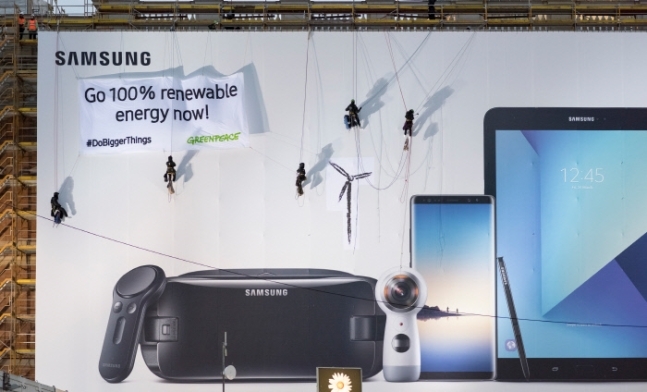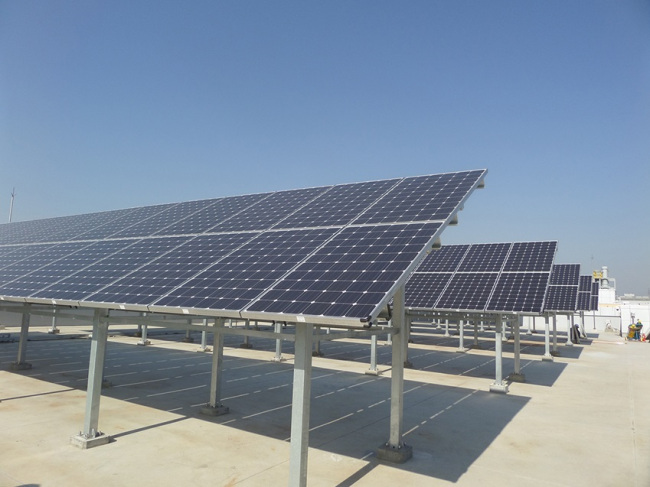Korean tech giants under pressure to go renewable
Global companies push Korean suppliers to follow green initiatives
By Shin Ji-hyePublished : Nov. 4, 2018 - 15:04
Korean tech firms are under increasing pressure from global companies, environmental activists, local governments and politics to expand the use of renewable energy, reflecting growing calls to protect the environment and fight climate change.
Last week, Korean chipmaker SK hynix announced it would obtain its power 100 percent from renewable resources for its overseas plants by 2022 and reduce greenhouse gas emission by 40 percent in its business sites in Korea.
SK hynix became the second electronics firm in Asia to make such an announcement, following Samsung Electronics.
“The decision made by SK hynix seemed to follow the green move of Samsung Electronics, which serves as kind of a pacesetter among Korean tech firms. More manufacturing firms like LG and Hyundai Motor will be pressured to follow the green move,” said Lee Jong-oh, director of local civic group Korea Sustainability Investing Forum.
Last week, Korean chipmaker SK hynix announced it would obtain its power 100 percent from renewable resources for its overseas plants by 2022 and reduce greenhouse gas emission by 40 percent in its business sites in Korea.
SK hynix became the second electronics firm in Asia to make such an announcement, following Samsung Electronics.
“The decision made by SK hynix seemed to follow the green move of Samsung Electronics, which serves as kind of a pacesetter among Korean tech firms. More manufacturing firms like LG and Hyundai Motor will be pressured to follow the green move,” said Lee Jong-oh, director of local civic group Korea Sustainability Investing Forum.

In June, Samsung Electronics announced its green initiatives of using renewable 3.1-gigawatt solar energy by 2020 in the way of expanding renewable energy in its plants in Korea and sourcing renewable energy for 100 percent of the energy used for all of its overseas plants.
Samsung said the drive was in line with the Korean government’s new energy policy to go renewable and fulfill its role as a global corporate citizen.
The tech giant has been under continued pressure from international environmental activist Greenpeace to expand the use of renewable energy. Last year, Samsung Electronics received a D-minus from Greenpeace in its scores of global tech firms’ eco-friendliness. Its rival Apple got a B-minus, both Dell and HP received C-pluses and Microsoft had a C-minus.
The activist group has also carried out diverse campaigns calling for the Korean tech firm to pay more attention to the environment in front of its headquarters in Korea.

Greenpeace has a history of pushing Korean firms to go renewable. In 2015, the nation’s largest search giant Naver announced the use of 100 percent renewable energy for its data center after the activist published its research outcome on local firms’ use of renewable sources for their data centers.
Apart from environmental groups, Korean companies are also under pressure from many of their global client firms that have committed to 100 percent renewable power and want their partner firms to follow along.
According to recent reports disclosed by Rep. Kim Hyun-kwon from the ruling Democratic Party of Korea, local battery firm LG Chem’s deal with German automaker BMW foundered due to the issue of the use of renewable energy. LG Chem is now facing similar calls from another German automaker Volkswagen. SK hynix was also asked by its client Apple to expand the use of renewable energy, according to Kim.
BMW, Volkswagen and Apple are among the 154 companies that joined RE100, a global campaign to make a commitment to go 100 percent renewable in offices, buildings and plants. Many more global firms across industries have joined the move, including Google, Facebook, Coca-Cola, Bloomberg, Burberry, General Motors and Goldman Sachs.
“Although the global pressure will eventually change the landscape of Korean firms’ energy use, Korea is still way behind other nations in terms of corporate willingness, infrastructure and legal grounds for green moves,” Lee said.
In many nations, including the US, European Union members, China and Taiwan, companies are able to buy renewable energy resources from private companies. In Korea, such infrastructure is absent and that is the reason behind Samsung and SK hynix’s excluding Korea in its plans to go 100 percent renewable.
“In other nations, companies can make a long-term power purchase agreement with either private or public power suppliers for the supplies of renewable energy. This long-term contract allows companies to be provided with renewable energy stably at an affordable price,” said Lee Jin-sun, a campaigner at Greenpeace Korea.
“But in Korea, energy is only provided by state-run Korea Electric Power Corporation, which is not even able to distinguish energy sources whether they are made from renewable energy or not,” she said.
In July, Rep. Lee Won-wook from the ruling Democratic Party proposed a bill to make Kepco distinguish energy sources. When the bill is passed, companies can purchase power made from renewable sources as Kepco should classify whether the power comes from renewable sources, coal or liquefied natural gas, or is nuclear.
Currently, less than 2 percent of all energy is made from renewable resources in Korea.
Despite some hurdles, Korean firms’ use of renewable energy is expected to speed up in the future in line with the Moon Jae-in administration’s energy policies. In December, the government announced “Renewable Energy 3020” with the goal to increase the proportion of renewable energy generated to 20 percent by 2030 from the current 7 percent.
By Shin Ji-hye (shinjh@heraldcorp.com)



![[Exclusive] Korean military set to ban iPhones over 'security' concerns](http://res.heraldm.com/phpwas/restmb_idxmake.php?idx=644&simg=/content/image/2024/04/23/20240423050599_0.jpg&u=20240423183955)

![[Graphic News] 77% of young Koreans still financially dependent](http://res.heraldm.com/phpwas/restmb_idxmake.php?idx=644&simg=/content/image/2024/04/22/20240422050762_0.gif&u=)



![[Pressure points] Leggings in public: Fashion statement or social faux pas?](http://res.heraldm.com/phpwas/restmb_idxmake.php?idx=644&simg=/content/image/2024/04/23/20240423050669_0.jpg&u=)










